Organizational Behaviour in BBC: Culture, Motivation and Teamwork
VerifiedAdded on 2024/06/13
|13
|2807
|134
Report
AI Summary
This report provides an in-depth analysis of organizational behaviour within the BBC, examining the impact of culture, power, and politics on employee behaviour. It uses Handy's cultural typology to identify the BBC's earlier organizational culture, analyzes how culture, power, and politics have affected behaviour, and discusses the culture being developed. The report explores how content and process theories of motivation, such as Maslow's hierarchy of needs and Herzberg's motivator-hygiene theory, can improve team effectiveness. It identifies different types of teams within the BBC, including functional, problem-solving, project, and virtual teams, and explains why having diverse teams is important. Finally, the report explains the components of an effective team in the BBC, relating it to Tuckman and Jensen's model of team development, highlighting the stages of forming, storming, norming, performing and adjourning.
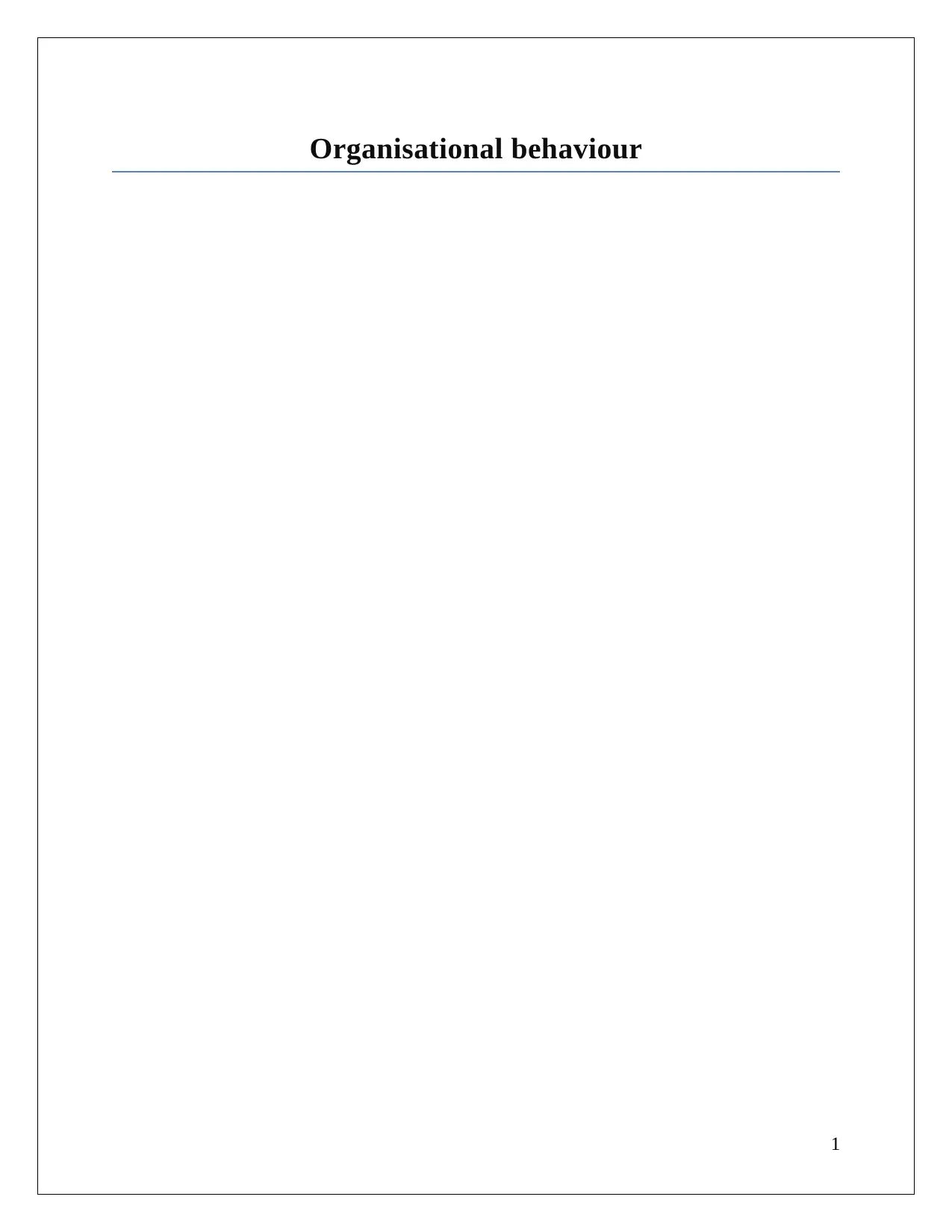
Organisational behaviour
1
1
Paraphrase This Document
Need a fresh take? Get an instant paraphrase of this document with our AI Paraphraser
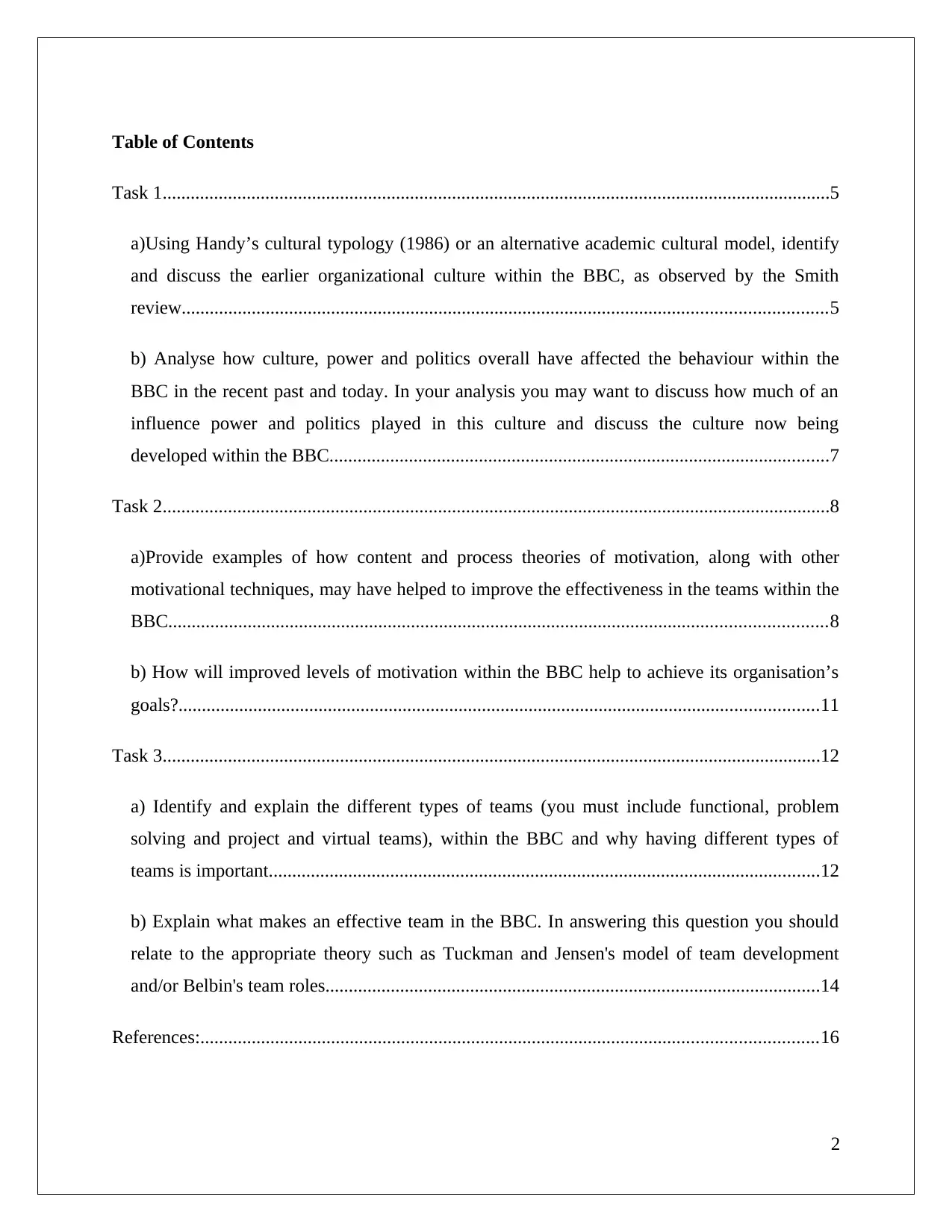
Table of Contents
Task 1...............................................................................................................................................5
a)Using Handy’s cultural typology (1986) or an alternative academic cultural model, identify
and discuss the earlier organizational culture within the BBC, as observed by the Smith
review..........................................................................................................................................5
b) Analyse how culture, power and politics overall have affected the behaviour within the
BBC in the recent past and today. In your analysis you may want to discuss how much of an
influence power and politics played in this culture and discuss the culture now being
developed within the BBC...........................................................................................................7
Task 2...............................................................................................................................................8
a)Provide examples of how content and process theories of motivation, along with other
motivational techniques, may have helped to improve the effectiveness in the teams within the
BBC.............................................................................................................................................8
b) How will improved levels of motivation within the BBC help to achieve its organisation’s
goals?.........................................................................................................................................11
Task 3.............................................................................................................................................12
a) Identify and explain the different types of teams (you must include functional, problem
solving and project and virtual teams), within the BBC and why having different types of
teams is important......................................................................................................................12
b) Explain what makes an effective team in the BBC. In answering this question you should
relate to the appropriate theory such as Tuckman and Jensen's model of team development
and/or Belbin's team roles..........................................................................................................14
References:....................................................................................................................................16
2
Task 1...............................................................................................................................................5
a)Using Handy’s cultural typology (1986) or an alternative academic cultural model, identify
and discuss the earlier organizational culture within the BBC, as observed by the Smith
review..........................................................................................................................................5
b) Analyse how culture, power and politics overall have affected the behaviour within the
BBC in the recent past and today. In your analysis you may want to discuss how much of an
influence power and politics played in this culture and discuss the culture now being
developed within the BBC...........................................................................................................7
Task 2...............................................................................................................................................8
a)Provide examples of how content and process theories of motivation, along with other
motivational techniques, may have helped to improve the effectiveness in the teams within the
BBC.............................................................................................................................................8
b) How will improved levels of motivation within the BBC help to achieve its organisation’s
goals?.........................................................................................................................................11
Task 3.............................................................................................................................................12
a) Identify and explain the different types of teams (you must include functional, problem
solving and project and virtual teams), within the BBC and why having different types of
teams is important......................................................................................................................12
b) Explain what makes an effective team in the BBC. In answering this question you should
relate to the appropriate theory such as Tuckman and Jensen's model of team development
and/or Belbin's team roles..........................................................................................................14
References:....................................................................................................................................16
2
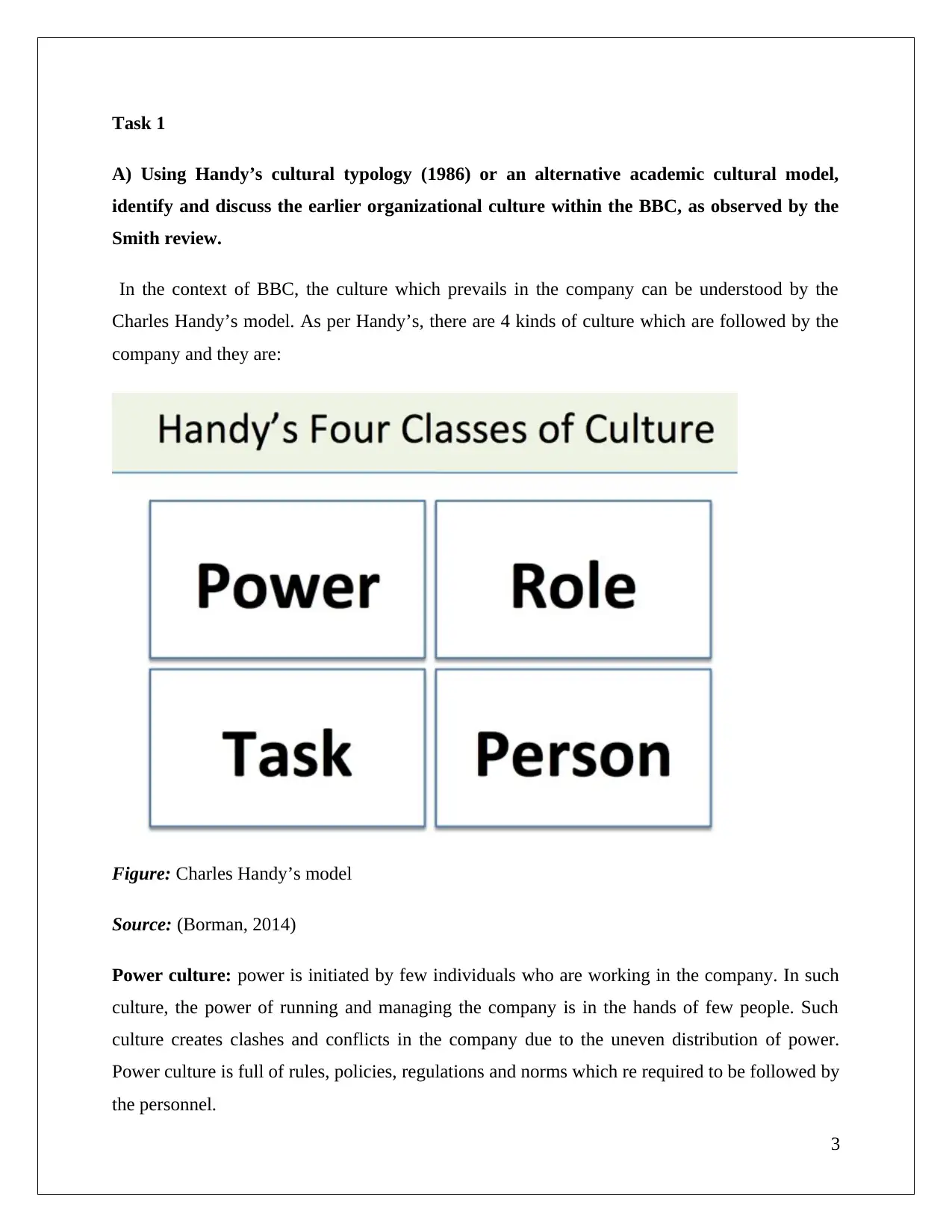
Task 1
A) Using Handy’s cultural typology (1986) or an alternative academic cultural model,
identify and discuss the earlier organizational culture within the BBC, as observed by the
Smith review.
In the context of BBC, the culture which prevails in the company can be understood by the
Charles Handy’s model. As per Handy’s, there are 4 kinds of culture which are followed by the
company and they are:
Figure: Charles Handy’s model
Source: (Borman, 2014)
Power culture: power is initiated by few individuals who are working in the company. In such
culture, the power of running and managing the company is in the hands of few people. Such
culture creates clashes and conflicts in the company due to the uneven distribution of power.
Power culture is full of rules, policies, regulations and norms which re required to be followed by
the personnel.
3
A) Using Handy’s cultural typology (1986) or an alternative academic cultural model,
identify and discuss the earlier organizational culture within the BBC, as observed by the
Smith review.
In the context of BBC, the culture which prevails in the company can be understood by the
Charles Handy’s model. As per Handy’s, there are 4 kinds of culture which are followed by the
company and they are:
Figure: Charles Handy’s model
Source: (Borman, 2014)
Power culture: power is initiated by few individuals who are working in the company. In such
culture, the power of running and managing the company is in the hands of few people. Such
culture creates clashes and conflicts in the company due to the uneven distribution of power.
Power culture is full of rules, policies, regulations and norms which re required to be followed by
the personnel.
3
⊘ This is a preview!⊘
Do you want full access?
Subscribe today to unlock all pages.

Trusted by 1+ million students worldwide
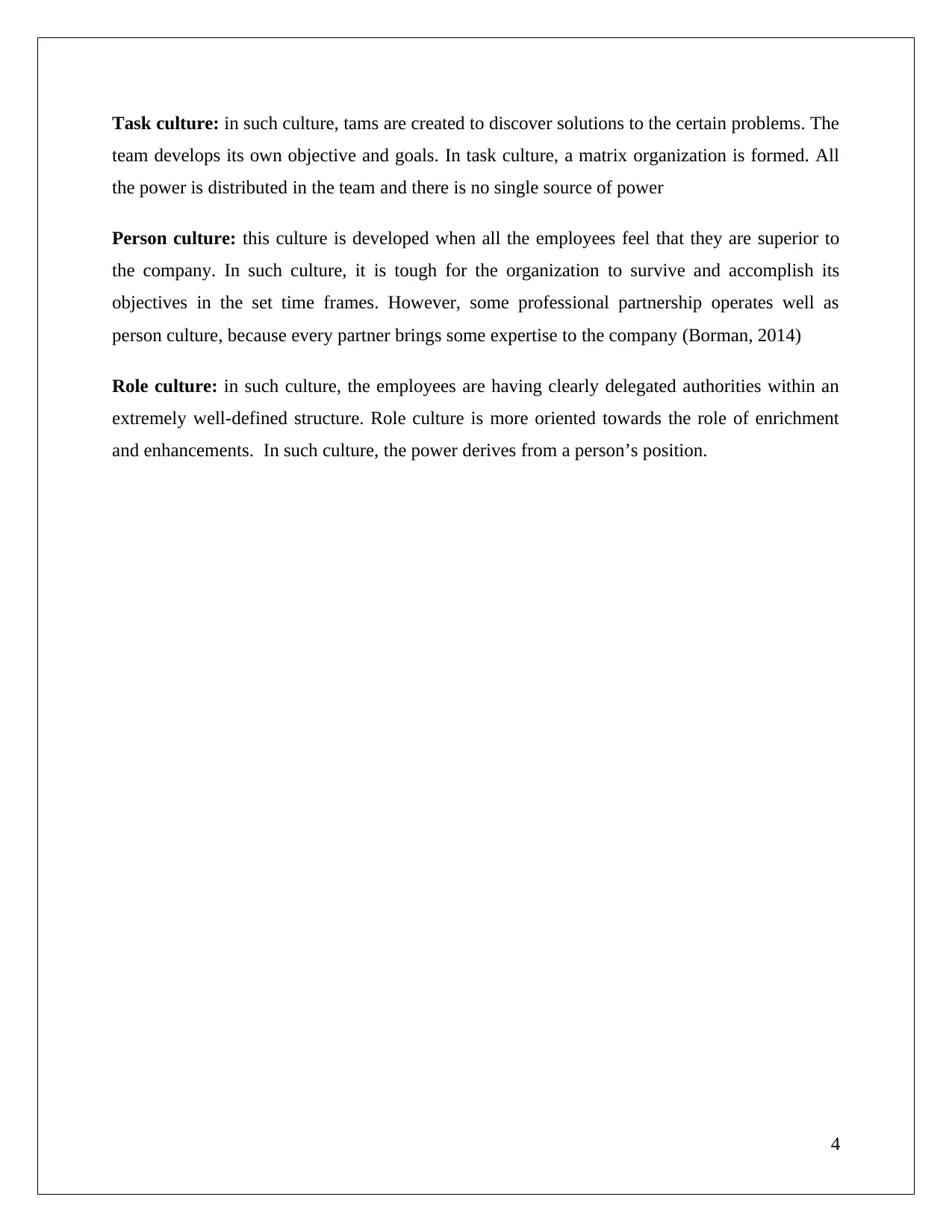
Task culture: in such culture, tams are created to discover solutions to the certain problems. The
team develops its own objective and goals. In task culture, a matrix organization is formed. All
the power is distributed in the team and there is no single source of power
Person culture: this culture is developed when all the employees feel that they are superior to
the company. In such culture, it is tough for the organization to survive and accomplish its
objectives in the set time frames. However, some professional partnership operates well as
person culture, because every partner brings some expertise to the company (Borman, 2014)
Role culture: in such culture, the employees are having clearly delegated authorities within an
extremely well-defined structure. Role culture is more oriented towards the role of enrichment
and enhancements. In such culture, the power derives from a person’s position.
4
team develops its own objective and goals. In task culture, a matrix organization is formed. All
the power is distributed in the team and there is no single source of power
Person culture: this culture is developed when all the employees feel that they are superior to
the company. In such culture, it is tough for the organization to survive and accomplish its
objectives in the set time frames. However, some professional partnership operates well as
person culture, because every partner brings some expertise to the company (Borman, 2014)
Role culture: in such culture, the employees are having clearly delegated authorities within an
extremely well-defined structure. Role culture is more oriented towards the role of enrichment
and enhancements. In such culture, the power derives from a person’s position.
4
Paraphrase This Document
Need a fresh take? Get an instant paraphrase of this document with our AI Paraphraser
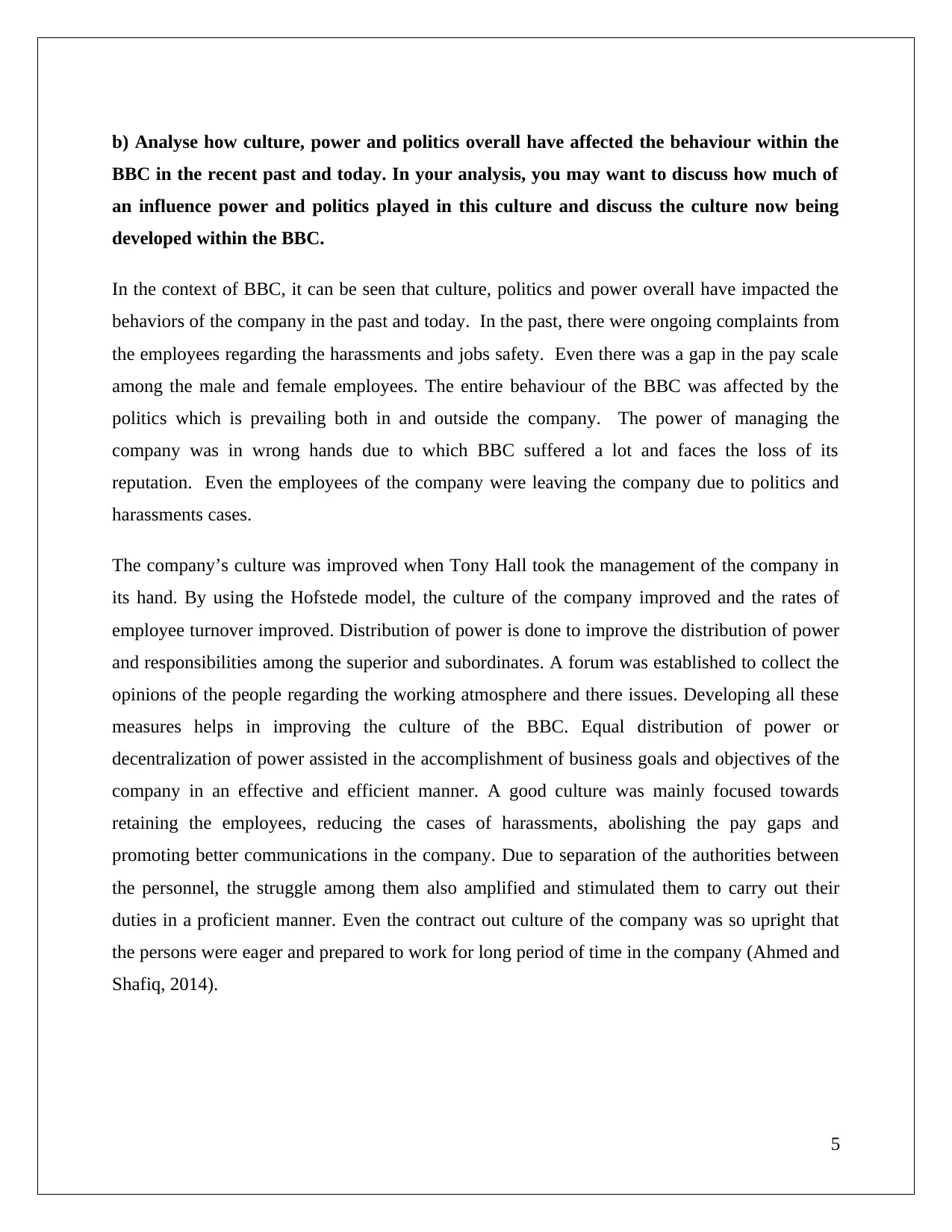
b) Analyse how culture, power and politics overall have affected the behaviour within the
BBC in the recent past and today. In your analysis, you may want to discuss how much of
an influence power and politics played in this culture and discuss the culture now being
developed within the BBC.
In the context of BBC, it can be seen that culture, politics and power overall have impacted the
behaviors of the company in the past and today. In the past, there were ongoing complaints from
the employees regarding the harassments and jobs safety. Even there was a gap in the pay scale
among the male and female employees. The entire behaviour of the BBC was affected by the
politics which is prevailing both in and outside the company. The power of managing the
company was in wrong hands due to which BBC suffered a lot and faces the loss of its
reputation. Even the employees of the company were leaving the company due to politics and
harassments cases.
The company’s culture was improved when Tony Hall took the management of the company in
its hand. By using the Hofstede model, the culture of the company improved and the rates of
employee turnover improved. Distribution of power is done to improve the distribution of power
and responsibilities among the superior and subordinates. A forum was established to collect the
opinions of the people regarding the working atmosphere and there issues. Developing all these
measures helps in improving the culture of the BBC. Equal distribution of power or
decentralization of power assisted in the accomplishment of business goals and objectives of the
company in an effective and efficient manner. A good culture was mainly focused towards
retaining the employees, reducing the cases of harassments, abolishing the pay gaps and
promoting better communications in the company. Due to separation of the authorities between
the personnel, the struggle among them also amplified and stimulated them to carry out their
duties in a proficient manner. Even the contract out culture of the company was so upright that
the persons were eager and prepared to work for long period of time in the company (Ahmed and
Shafiq, 2014).
5
BBC in the recent past and today. In your analysis, you may want to discuss how much of
an influence power and politics played in this culture and discuss the culture now being
developed within the BBC.
In the context of BBC, it can be seen that culture, politics and power overall have impacted the
behaviors of the company in the past and today. In the past, there were ongoing complaints from
the employees regarding the harassments and jobs safety. Even there was a gap in the pay scale
among the male and female employees. The entire behaviour of the BBC was affected by the
politics which is prevailing both in and outside the company. The power of managing the
company was in wrong hands due to which BBC suffered a lot and faces the loss of its
reputation. Even the employees of the company were leaving the company due to politics and
harassments cases.
The company’s culture was improved when Tony Hall took the management of the company in
its hand. By using the Hofstede model, the culture of the company improved and the rates of
employee turnover improved. Distribution of power is done to improve the distribution of power
and responsibilities among the superior and subordinates. A forum was established to collect the
opinions of the people regarding the working atmosphere and there issues. Developing all these
measures helps in improving the culture of the BBC. Equal distribution of power or
decentralization of power assisted in the accomplishment of business goals and objectives of the
company in an effective and efficient manner. A good culture was mainly focused towards
retaining the employees, reducing the cases of harassments, abolishing the pay gaps and
promoting better communications in the company. Due to separation of the authorities between
the personnel, the struggle among them also amplified and stimulated them to carry out their
duties in a proficient manner. Even the contract out culture of the company was so upright that
the persons were eager and prepared to work for long period of time in the company (Ahmed and
Shafiq, 2014).
5
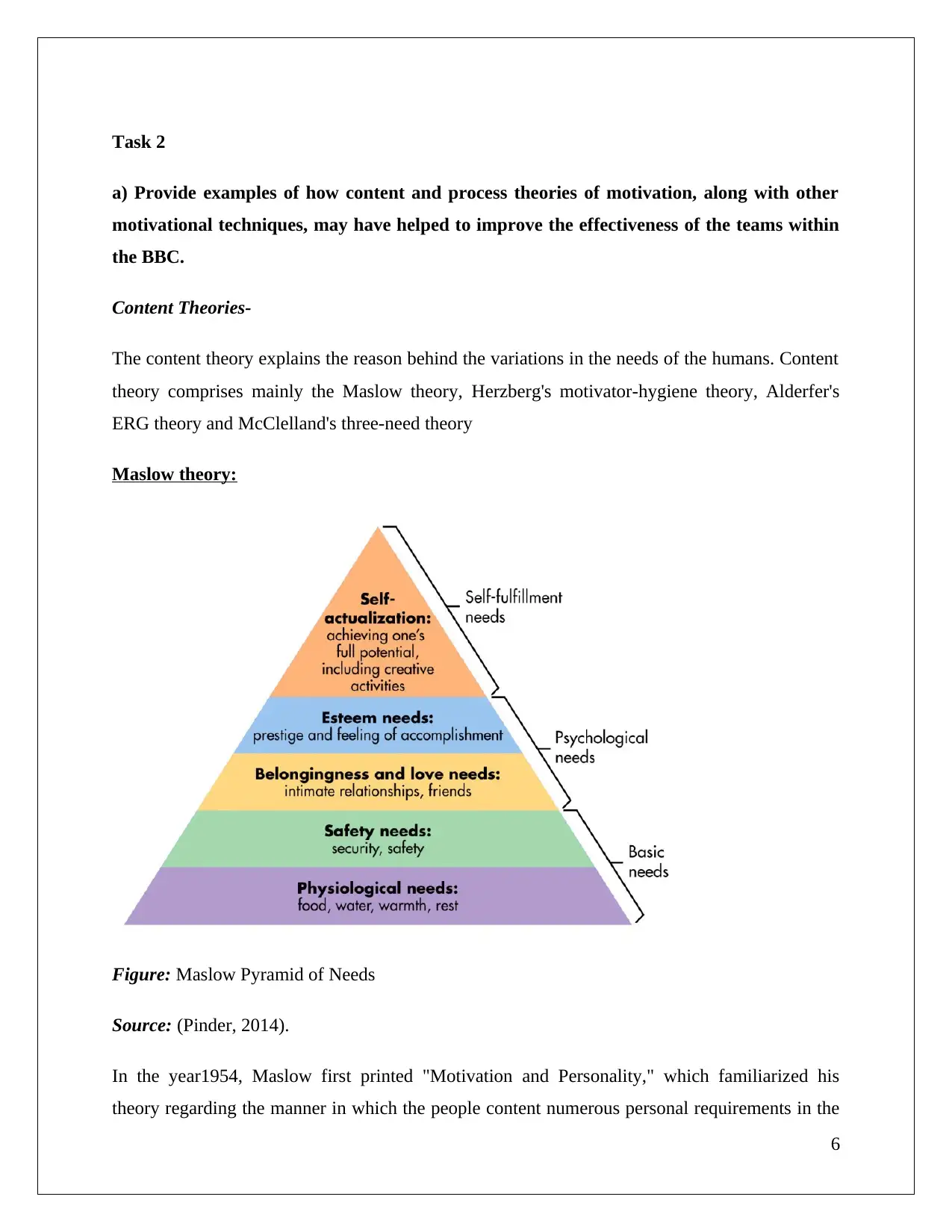
Task 2
a) Provide examples of how content and process theories of motivation, along with other
motivational techniques, may have helped to improve the effectiveness of the teams within
the BBC.
Content Theories-
The content theory explains the reason behind the variations in the needs of the humans. Content
theory comprises mainly the Maslow theory, Herzberg's motivator-hygiene theory, Alderfer's
ERG theory and McClelland's three-need theory
Maslow theory:
Figure: Maslow Pyramid of Needs
Source: (Pinder, 2014).
In the year1954, Maslow first printed "Motivation and Personality," which familiarized his
theory regarding the manner in which the people content numerous personal requirements in the
6
a) Provide examples of how content and process theories of motivation, along with other
motivational techniques, may have helped to improve the effectiveness of the teams within
the BBC.
Content Theories-
The content theory explains the reason behind the variations in the needs of the humans. Content
theory comprises mainly the Maslow theory, Herzberg's motivator-hygiene theory, Alderfer's
ERG theory and McClelland's three-need theory
Maslow theory:
Figure: Maslow Pyramid of Needs
Source: (Pinder, 2014).
In the year1954, Maslow first printed "Motivation and Personality," which familiarized his
theory regarding the manner in which the people content numerous personal requirements in the
6
⊘ This is a preview!⊘
Do you want full access?
Subscribe today to unlock all pages.

Trusted by 1+ million students worldwide
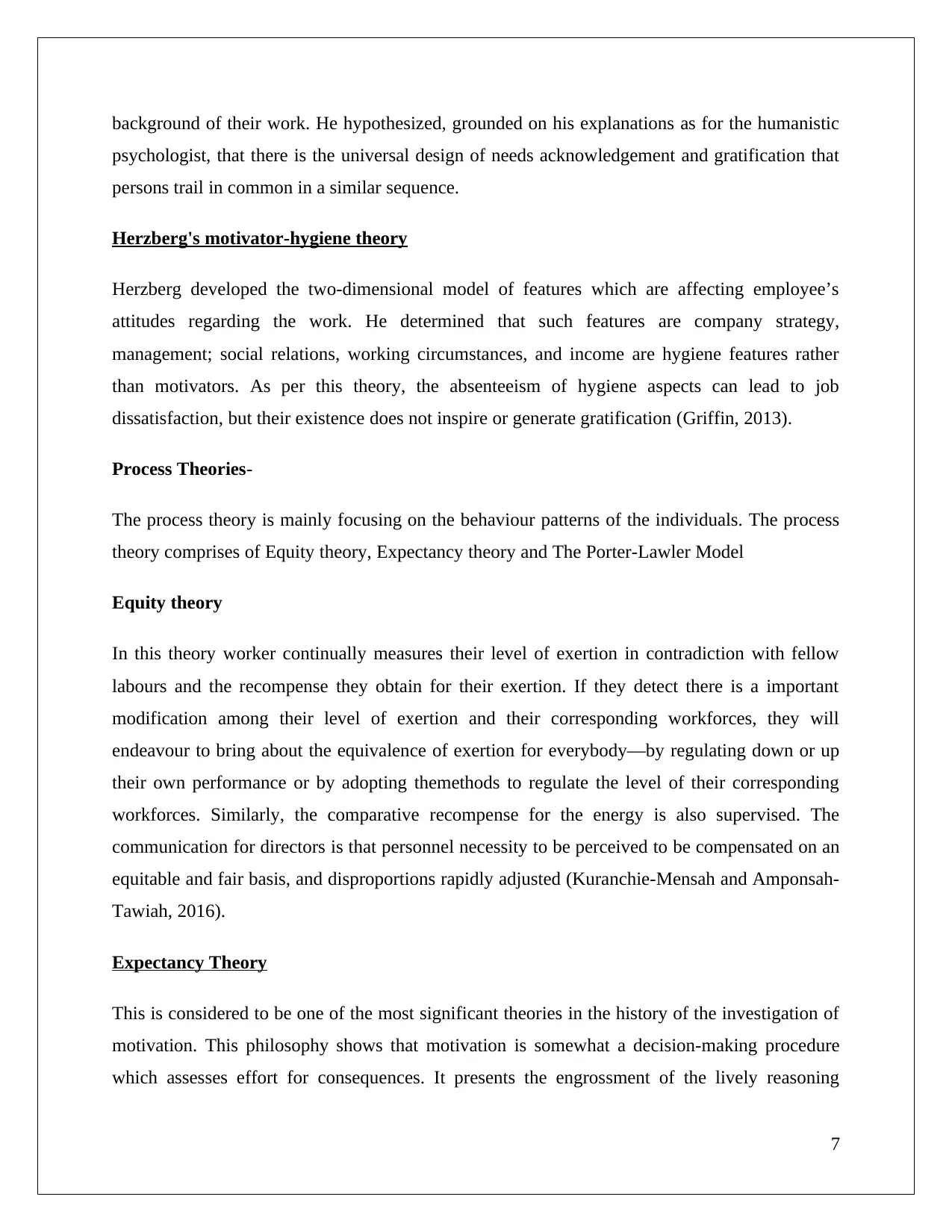
background of their work. He hypothesized, grounded on his explanations as for the humanistic
psychologist, that there is the universal design of needs acknowledgement and gratification that
persons trail in common in a similar sequence.
Herzberg's motivator-hygiene theory
Herzberg developed the two-dimensional model of features which are affecting employee’s
attitudes regarding the work. He determined that such features are company strategy,
management; social relations, working circumstances, and income are hygiene features rather
than motivators. As per this theory, the absenteeism of hygiene aspects can lead to job
dissatisfaction, but their existence does not inspire or generate gratification (Griffin, 2013).
Process Theories-
The process theory is mainly focusing on the behaviour patterns of the individuals. The process
theory comprises of Equity theory, Expectancy theory and The Porter-Lawler Model
Equity theory
In this theory worker continually measures their level of exertion in contradiction with fellow
labours and the recompense they obtain for their exertion. If they detect there is a important
modification among their level of exertion and their corresponding workforces, they will
endeavour to bring about the equivalence of exertion for everybody—by regulating down or up
their own performance or by adopting themethods to regulate the level of their corresponding
workforces. Similarly, the comparative recompense for the energy is also supervised. The
communication for directors is that personnel necessity to be perceived to be compensated on an
equitable and fair basis, and disproportions rapidly adjusted (Kuranchie-Mensah and Amponsah-
Tawiah, 2016).
Expectancy Theory
This is considered to be one of the most significant theories in the history of the investigation of
motivation. This philosophy shows that motivation is somewhat a decision-making procedure
which assesses effort for consequences. It presents the engrossment of the lively reasoning
7
psychologist, that there is the universal design of needs acknowledgement and gratification that
persons trail in common in a similar sequence.
Herzberg's motivator-hygiene theory
Herzberg developed the two-dimensional model of features which are affecting employee’s
attitudes regarding the work. He determined that such features are company strategy,
management; social relations, working circumstances, and income are hygiene features rather
than motivators. As per this theory, the absenteeism of hygiene aspects can lead to job
dissatisfaction, but their existence does not inspire or generate gratification (Griffin, 2013).
Process Theories-
The process theory is mainly focusing on the behaviour patterns of the individuals. The process
theory comprises of Equity theory, Expectancy theory and The Porter-Lawler Model
Equity theory
In this theory worker continually measures their level of exertion in contradiction with fellow
labours and the recompense they obtain for their exertion. If they detect there is a important
modification among their level of exertion and their corresponding workforces, they will
endeavour to bring about the equivalence of exertion for everybody—by regulating down or up
their own performance or by adopting themethods to regulate the level of their corresponding
workforces. Similarly, the comparative recompense for the energy is also supervised. The
communication for directors is that personnel necessity to be perceived to be compensated on an
equitable and fair basis, and disproportions rapidly adjusted (Kuranchie-Mensah and Amponsah-
Tawiah, 2016).
Expectancy Theory
This is considered to be one of the most significant theories in the history of the investigation of
motivation. This philosophy shows that motivation is somewhat a decision-making procedure
which assesses effort for consequences. It presents the engrossment of the lively reasoning
7
Paraphrase This Document
Need a fresh take? Get an instant paraphrase of this document with our AI Paraphraser
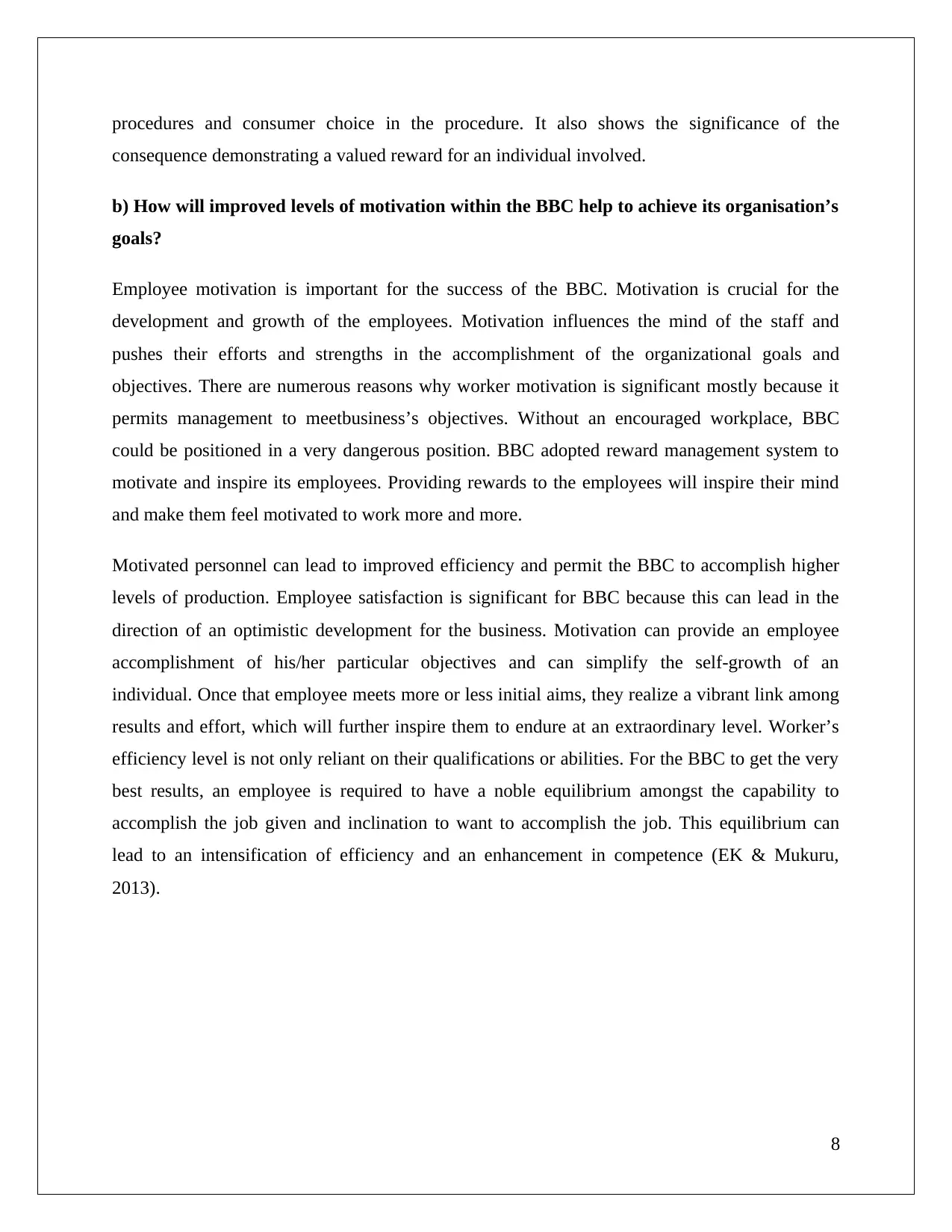
procedures and consumer choice in the procedure. It also shows the significance of the
consequence demonstrating a valued reward for an individual involved.
b) How will improved levels of motivation within the BBC help to achieve its organisation’s
goals?
Employee motivation is important for the success of the BBC. Motivation is crucial for the
development and growth of the employees. Motivation influences the mind of the staff and
pushes their efforts and strengths in the accomplishment of the organizational goals and
objectives. There are numerous reasons why worker motivation is significant mostly because it
permits management to meetbusiness’s objectives. Without an encouraged workplace, BBC
could be positioned in a very dangerous position. BBC adopted reward management system to
motivate and inspire its employees. Providing rewards to the employees will inspire their mind
and make them feel motivated to work more and more.
Motivated personnel can lead to improved efficiency and permit the BBC to accomplish higher
levels of production. Employee satisfaction is significant for BBC because this can lead in the
direction of an optimistic development for the business. Motivation can provide an employee
accomplishment of his/her particular objectives and can simplify the self-growth of an
individual. Once that employee meets more or less initial aims, they realize a vibrant link among
results and effort, which will further inspire them to endure at an extraordinary level. Worker’s
efficiency level is not only reliant on their qualifications or abilities. For the BBC to get the very
best results, an employee is required to have a noble equilibrium amongst the capability to
accomplish the job given and inclination to want to accomplish the job. This equilibrium can
lead to an intensification of efficiency and an enhancement in competence (EK & Mukuru,
2013).
8
consequence demonstrating a valued reward for an individual involved.
b) How will improved levels of motivation within the BBC help to achieve its organisation’s
goals?
Employee motivation is important for the success of the BBC. Motivation is crucial for the
development and growth of the employees. Motivation influences the mind of the staff and
pushes their efforts and strengths in the accomplishment of the organizational goals and
objectives. There are numerous reasons why worker motivation is significant mostly because it
permits management to meetbusiness’s objectives. Without an encouraged workplace, BBC
could be positioned in a very dangerous position. BBC adopted reward management system to
motivate and inspire its employees. Providing rewards to the employees will inspire their mind
and make them feel motivated to work more and more.
Motivated personnel can lead to improved efficiency and permit the BBC to accomplish higher
levels of production. Employee satisfaction is significant for BBC because this can lead in the
direction of an optimistic development for the business. Motivation can provide an employee
accomplishment of his/her particular objectives and can simplify the self-growth of an
individual. Once that employee meets more or less initial aims, they realize a vibrant link among
results and effort, which will further inspire them to endure at an extraordinary level. Worker’s
efficiency level is not only reliant on their qualifications or abilities. For the BBC to get the very
best results, an employee is required to have a noble equilibrium amongst the capability to
accomplish the job given and inclination to want to accomplish the job. This equilibrium can
lead to an intensification of efficiency and an enhancement in competence (EK & Mukuru,
2013).
8
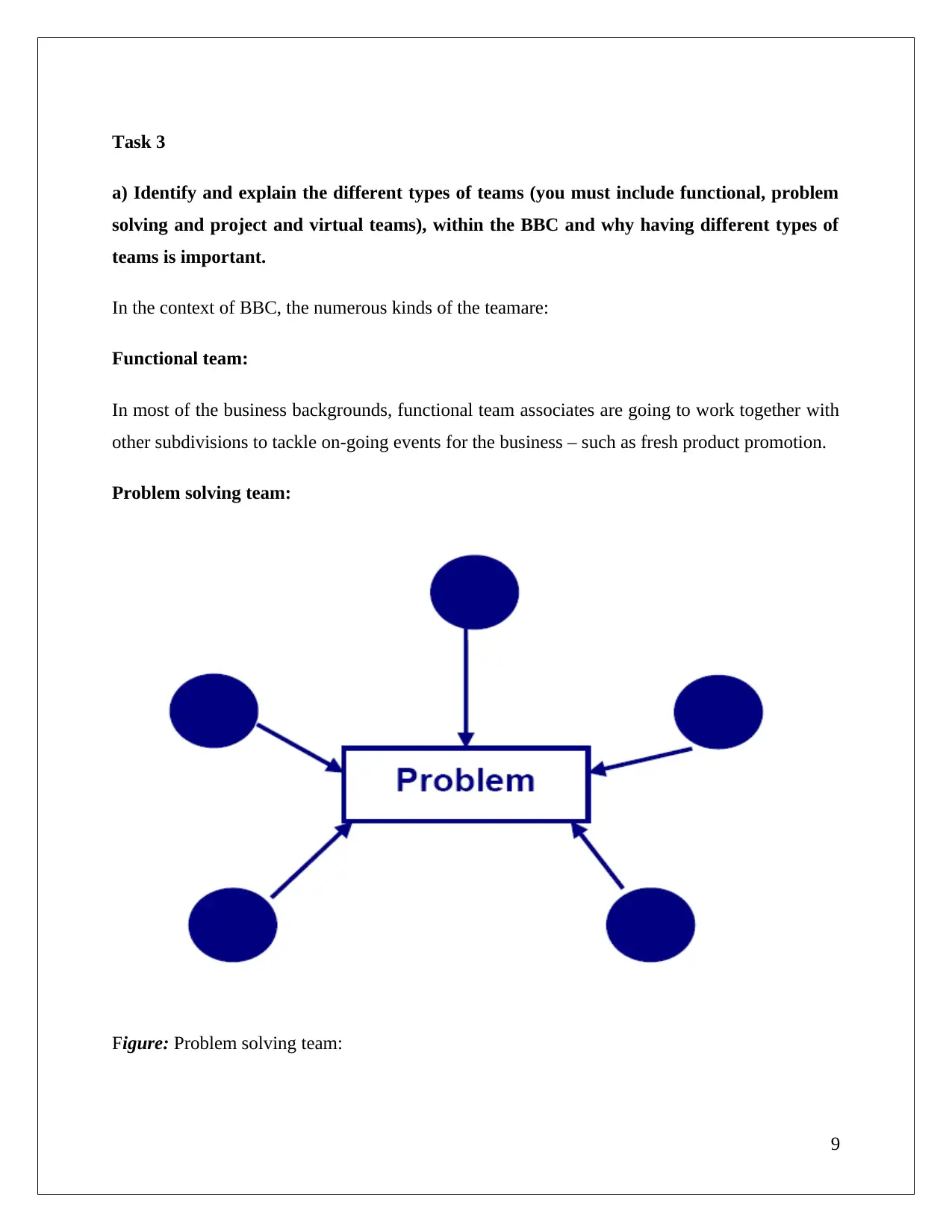
Task 3
a) Identify and explain the different types of teams (you must include functional, problem
solving and project and virtual teams), within the BBC and why having different types of
teams is important.
In the context of BBC, the numerous kinds of the teamare:
Functional team:
In most of the business backgrounds, functional team associates are going to work together with
other subdivisions to tackle on-going events for the business – such as fresh product promotion.
Problem solving team:
Figure: Problem solving team:
9
a) Identify and explain the different types of teams (you must include functional, problem
solving and project and virtual teams), within the BBC and why having different types of
teams is important.
In the context of BBC, the numerous kinds of the teamare:
Functional team:
In most of the business backgrounds, functional team associates are going to work together with
other subdivisions to tackle on-going events for the business – such as fresh product promotion.
Problem solving team:
Figure: Problem solving team:
9
⊘ This is a preview!⊘
Do you want full access?
Subscribe today to unlock all pages.

Trusted by 1+ million students worldwide
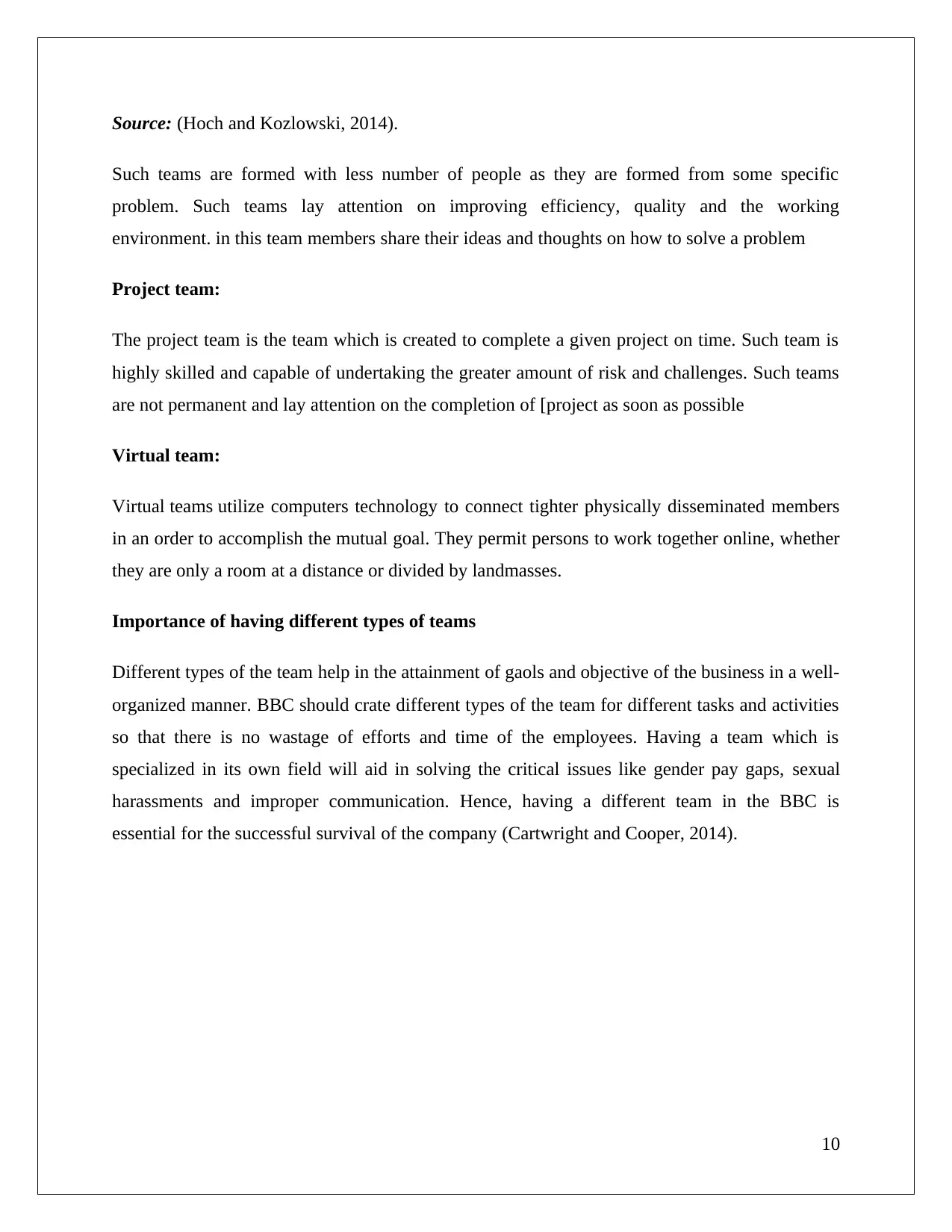
Source: (Hoch and Kozlowski, 2014).
Such teams are formed with less number of people as they are formed from some specific
problem. Such teams lay attention on improving efficiency, quality and the working
environment. in this team members share their ideas and thoughts on how to solve a problem
Project team:
The project team is the team which is created to complete a given project on time. Such team is
highly skilled and capable of undertaking the greater amount of risk and challenges. Such teams
are not permanent and lay attention on the completion of [project as soon as possible
Virtual team:
Virtual teams utilize computers technology to connect tighter physically disseminated members
in an order to accomplish the mutual goal. They permit persons to work together online, whether
they are only a room at a distance or divided by landmasses.
Importance of having different types of teams
Different types of the team help in the attainment of gaols and objective of the business in a well-
organized manner. BBC should crate different types of the team for different tasks and activities
so that there is no wastage of efforts and time of the employees. Having a team which is
specialized in its own field will aid in solving the critical issues like gender pay gaps, sexual
harassments and improper communication. Hence, having a different team in the BBC is
essential for the successful survival of the company (Cartwright and Cooper, 2014).
10
Such teams are formed with less number of people as they are formed from some specific
problem. Such teams lay attention on improving efficiency, quality and the working
environment. in this team members share their ideas and thoughts on how to solve a problem
Project team:
The project team is the team which is created to complete a given project on time. Such team is
highly skilled and capable of undertaking the greater amount of risk and challenges. Such teams
are not permanent and lay attention on the completion of [project as soon as possible
Virtual team:
Virtual teams utilize computers technology to connect tighter physically disseminated members
in an order to accomplish the mutual goal. They permit persons to work together online, whether
they are only a room at a distance or divided by landmasses.
Importance of having different types of teams
Different types of the team help in the attainment of gaols and objective of the business in a well-
organized manner. BBC should crate different types of the team for different tasks and activities
so that there is no wastage of efforts and time of the employees. Having a team which is
specialized in its own field will aid in solving the critical issues like gender pay gaps, sexual
harassments and improper communication. Hence, having a different team in the BBC is
essential for the successful survival of the company (Cartwright and Cooper, 2014).
10
Paraphrase This Document
Need a fresh take? Get an instant paraphrase of this document with our AI Paraphraser
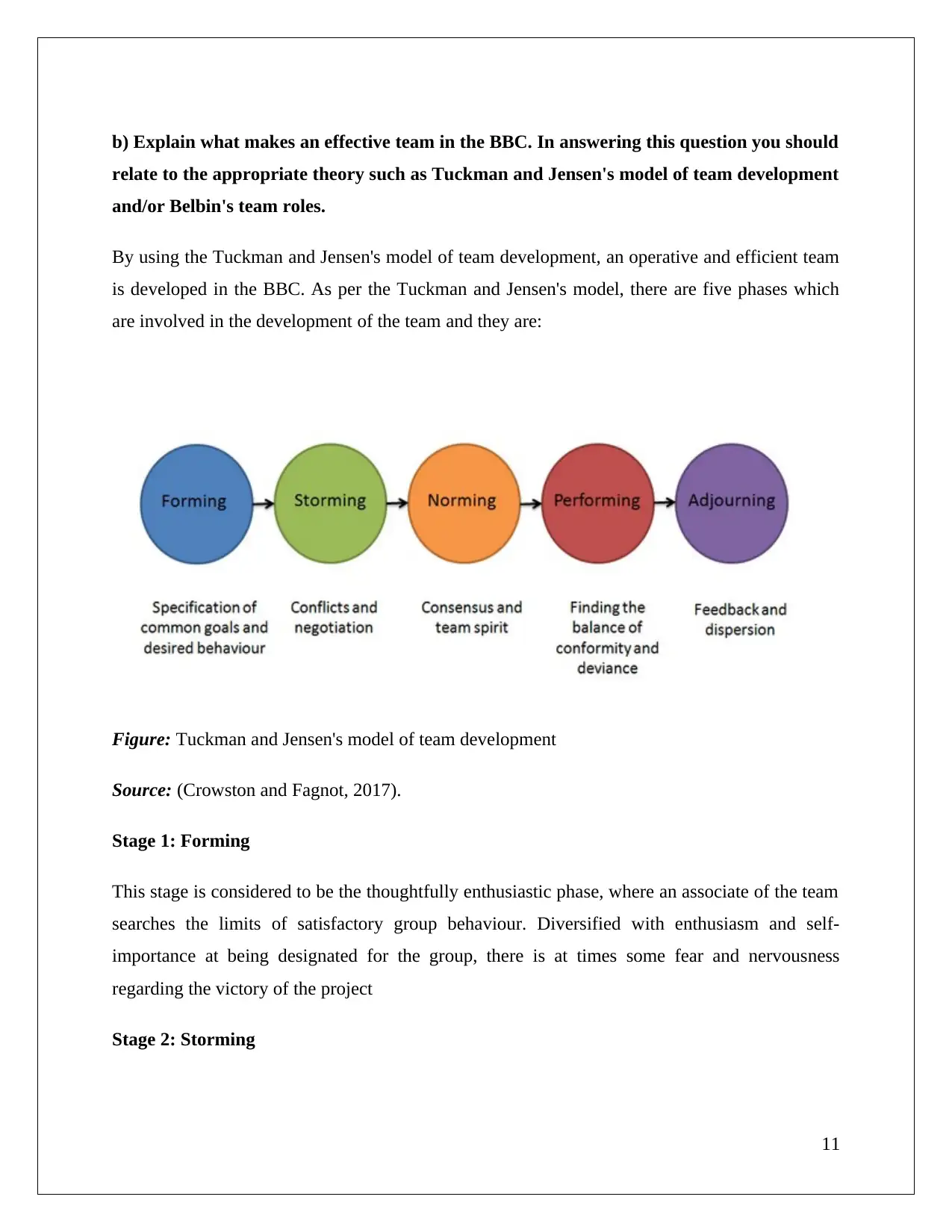
b) Explain what makes an effective team in the BBC. In answering this question you should
relate to the appropriate theory such as Tuckman and Jensen's model of team development
and/or Belbin's team roles.
By using the Tuckman and Jensen's model of team development, an operative and efficient team
is developed in the BBC. As per the Tuckman and Jensen's model, there are five phases which
are involved in the development of the team and they are:
Figure: Tuckman and Jensen's model of team development
Source: (Crowston and Fagnot, 2017).
Stage 1: Forming
This stage is considered to be the thoughtfully enthusiastic phase, where an associate of the team
searches the limits of satisfactory group behaviour. Diversified with enthusiasm and self-
importance at being designated for the group, there is at times some fear and nervousness
regarding the victory of the project
Stage 2: Storming
11
relate to the appropriate theory such as Tuckman and Jensen's model of team development
and/or Belbin's team roles.
By using the Tuckman and Jensen's model of team development, an operative and efficient team
is developed in the BBC. As per the Tuckman and Jensen's model, there are five phases which
are involved in the development of the team and they are:
Figure: Tuckman and Jensen's model of team development
Source: (Crowston and Fagnot, 2017).
Stage 1: Forming
This stage is considered to be the thoughtfully enthusiastic phase, where an associate of the team
searches the limits of satisfactory group behaviour. Diversified with enthusiasm and self-
importance at being designated for the group, there is at times some fear and nervousness
regarding the victory of the project
Stage 2: Storming
11
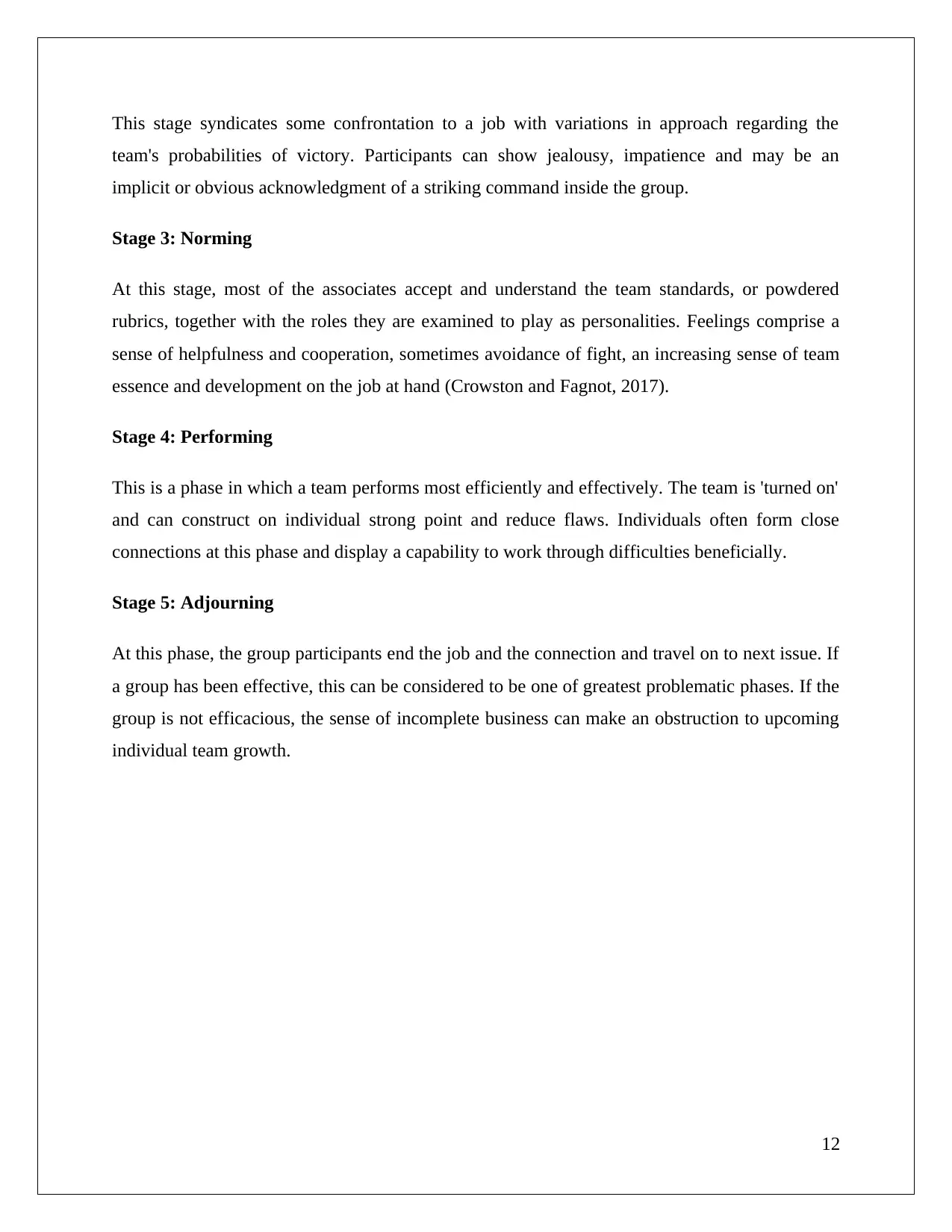
This stage syndicates some confrontation to a job with variations in approach regarding the
team's probabilities of victory. Participants can show jealousy, impatience and may be an
implicit or obvious acknowledgment of a striking command inside the group.
Stage 3: Norming
At this stage, most of the associates accept and understand the team standards, or powdered
rubrics, together with the roles they are examined to play as personalities. Feelings comprise a
sense of helpfulness and cooperation, sometimes avoidance of fight, an increasing sense of team
essence and development on the job at hand (Crowston and Fagnot, 2017).
Stage 4: Performing
This is a phase in which a team performs most efficiently and effectively. The team is 'turned on'
and can construct on individual strong point and reduce flaws. Individuals often form close
connections at this phase and display a capability to work through difficulties beneficially.
Stage 5: Adjourning
At this phase, the group participants end the job and the connection and travel on to next issue. If
a group has been effective, this can be considered to be one of greatest problematic phases. If the
group is not efficacious, the sense of incomplete business can make an obstruction to upcoming
individual team growth.
12
team's probabilities of victory. Participants can show jealousy, impatience and may be an
implicit or obvious acknowledgment of a striking command inside the group.
Stage 3: Norming
At this stage, most of the associates accept and understand the team standards, or powdered
rubrics, together with the roles they are examined to play as personalities. Feelings comprise a
sense of helpfulness and cooperation, sometimes avoidance of fight, an increasing sense of team
essence and development on the job at hand (Crowston and Fagnot, 2017).
Stage 4: Performing
This is a phase in which a team performs most efficiently and effectively. The team is 'turned on'
and can construct on individual strong point and reduce flaws. Individuals often form close
connections at this phase and display a capability to work through difficulties beneficially.
Stage 5: Adjourning
At this phase, the group participants end the job and the connection and travel on to next issue. If
a group has been effective, this can be considered to be one of greatest problematic phases. If the
group is not efficacious, the sense of incomplete business can make an obstruction to upcoming
individual team growth.
12
⊘ This is a preview!⊘
Do you want full access?
Subscribe today to unlock all pages.

Trusted by 1+ million students worldwide
1 out of 13
Related Documents
Your All-in-One AI-Powered Toolkit for Academic Success.
+13062052269
info@desklib.com
Available 24*7 on WhatsApp / Email
![[object Object]](/_next/static/media/star-bottom.7253800d.svg)
Unlock your academic potential
Copyright © 2020–2026 A2Z Services. All Rights Reserved. Developed and managed by ZUCOL.





